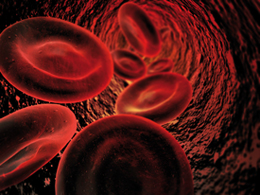Fish oils healthier for women's hearts than men's
Release Date 11 October 2012

When it comes to matters of a healthy heart women may benefit more from eating oily fish than men, a new study has found.
The research, conducted at the University of Reading, also showed for the first time that fish oils could be better for our heart in more ways than previously thought by having more of a direct impact on the muscle cells that control the elasticity of our blood vessels.
According to the British Heart Foundation heart disease is the single biggest killer of women in the UK, causing three times more deaths than breast cancer. Many of these deaths may be prevented by the right lifestyle, including diet. Saturated fat is thought to have long-term negative effects on our heart because it raises levels of bad cholesterol and reduces the elasticity of our blood vessels which can lead to high blood pressure.
Reading researchers introduced small amounts of fish oils to the meals of both men and women containing saturated fat. They found that elasticity was improved four-fold in women compared with two-fold in men. In fact the beneficial effect of the fish oil in women was as potent as that of drugs that are prescribed to people with poor blood vessel elasticity, such as those with diabetes.
Professor Christine Williams, the University's first Hugh Sinclair Professor of Nutrition and Pro-Vice-Chancellor for Research and Innovation who led the study, said: "Studies examining women's heart health are much less common than those which study men, partly because the studies are harder to carry out in women due to the varying effects of hormones during the menstrual cycle. In addition, many believe men are the only ones to suffer from heart disease. However nearly 40,000 women die of coronary heart disease each year in the UK and we do not yet know whether all the diet recommendations which we currently advise are as effective for women as for men. The good news here is that current recommendations that we should all eat more oily fish appears to be more effective for women than men.
"As well as discovering the effect of fish oils is greater in women we also found that people with a gene variation that produces the protein eNOS, which helps to increase blood flow, also benefitted more. Our study showed that people who carry the rarer form of the protein, which is about 10% of the UK/world population, respond twice as well to fish oils, suggesting they would particularly benefit from additional oily fish intake.
"This research supports the view that the effects of diets vary, being more effective in certain genders and genotypes. Our study was very carefully designed to include equal numbers of men and women and also equal numbers of people with the two types of gene variants, so that the results are very unlikely to be due to chance. Although the responses varied, all the subjects in the study benefitted from taking fish oils with a meal. However, for women and those with the gene variant, the responses were very marked indeed, and when it comes to their diet could give them considerable health benefits in the future."
Fish oil is known to increase the release of nitric oxide from the lining of the blood vessel wall which causes relaxation of the vessel and increases blood flow. However the researchers found that some of the relaxation effect on the blood vessel wall may be due to direct actions of the fish oil acting on the muscle cells themselves, rather than on the cells lining the blood vessel wall.
Professor Williams added: "This is an exciting discovery which gives us a new way of looking at how our diet affects the health of our blood vessels, and possibly more effective ways of improving heart health in the future."
The study was undertaken in the University of Reading's Hugh Sinclair Human Nutrition Group, which has an international reputation for its research into the relationship between diet and the risk of chronic disease such as cardiovascular disease, diabetes, neurodegenerative disease and cancer.
Glu298Asp polymorphism influences the beneficial effects of fish oil fatty acids on postprandial vascular function[S] was published on 1 October in the Journal of Lipid Research. The work was funded by the Biotechnology and Biological Sciences Research Council
ENDS
For all media enquiries please contact James Barr, University of Reading Press Officer on 0118 378 7115 or by email on j.w.barr@reading.ac.uk
Follow us on Twitter | Like us on Facebook | Read our research blog 'The Forum'
Notes for editors:
The University of Reading is ranked among the top 1% of universities in the world (THE World University Rankings 2012) and is one of the UK's top research-intensive universities. The University is ranked in the top 20 for the number of awards it received from research councils for 2010/11.
The Hugh Sinclair Unit of Human Nutrition is part of the University of Reading's Department of Food and Nutritional Sciences. It has an international reputation for its research into the relationship between diet and the risk of chronic disease such as cardiovascular disease, diabetes, neurodegenerative disease and cancer. It collaborates with centres of excellence throughout the world and has strong links with food companies.
